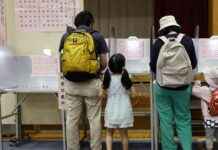This prospect worries the international community, especially since the country will be governed by a government responsible for managing current affairs, political differences having prevented the formation of a new cabinet since the spring legislative elections.
On Monday, Parliament met for the fourth time in a month without succeeding in electing a president, neither the camp of pro-Iranian Hezbollah, the powerful armed movement which dominates political life in Lebanon, nor that of its opponents having no of a clear majority to impose a candidate.
“The most likely scenario after the end of Aoun’s term is a prolonged presidential vacuum until the main Lebanese political parties agree on a candidate,” said Lina Khatib, director of the Middle East and North Africa program at the Chatham House think tank.
“As in 2016, Hezbollah will insist on imposing a candidate,” she adds.
In the past, the election of a president has already led to violence or political crises, in a country based on a community sharing of power, the presidency of the Republic being reserved for a Maronite Christian.
According to analysts, the current crisis is mainly linked to Hezbollah’s refusal of any electoral process that would not lead its candidate to the presidency, like what happened during the election of its ally Michel Aoun.
It then took more than two years and 46 electoral sessions for the election in 2016 of Mr. Aoun. His tenure was marked by an unprecedented economic collapse, a popular uprising in 2019 that failed and an explosion at the port of Beirut that ravaged the capital the following year.
– “Systematic blocking” –
Hezbollah has not announced which candidate it favors this time around, and its side has so far voted blank in parliament. But some analysts believe that former minister and MP Suleiman Frangié, an ally of Hezbollah and the Syrian regime, is his favorite candidate.
Asked by AFP, a source close to the Shiite party acknowledges, however, that the latter’s candidacy “runs up against opposition from Saudi Arabia” and Gebran Bassil, son-in-law of President Aoun and leader of the Free Patriotic Movement (CPL). ) who also aspires to the presidency.
For the moment, the candidate with the highest number of votes is Michel Moawad, who obtained 39 votes on Monday, far from the 65 votes required to be elected by simple majority.
Close to Washington, he was rejected by Hezbollah, whose disarmament he called for.
The Hezbollah camp and its allies are working on a “systematic obstruction”, denounces Elias Hankache, a member of the Christian Kataeb party which supports Mr. Moawad.
He considers “unacceptable” that the pro-Iranian party and its allies “are betting on the power vacuum” in order to subsequently impose their candidate, as in 2016.
– Diplomatic concern –
The prospect of a political vacuum is this time in a context of accelerated economic collapse while the resigning government does not have the prerogatives to impose the reforms necessary to release international aid.
Since 2019, Lebanon has been in the grip of a serious financial crisis, its currency has lost more than 95% of its value and more than 80% of the inhabitants now live below the poverty line, according to the UN.
A Western diplomatic source told AFP that most chancelleries in Beirut are “concerned” by the possibility that “Lebanon will not have a president after the end of Aoun’s term”.
“The political crisis is the last thing the Lebanese need right now,” the source added.
The fact that a resigning government leads the country would lead to “creating a very worrying situation”, according to the same source.
For the director of the Levant Institute for Strategic Affairs, Sami Nader, “failing agreement on a candidate between the parties in Lebanon, pressure or foreign interference could be necessary” to impose a solution, as on several occasions in the history of Lebanon.








